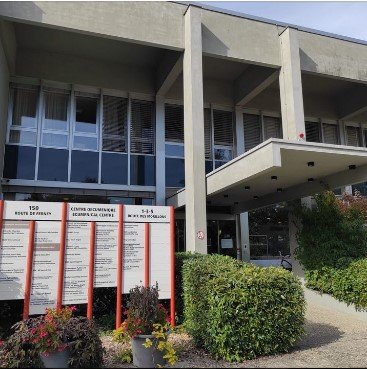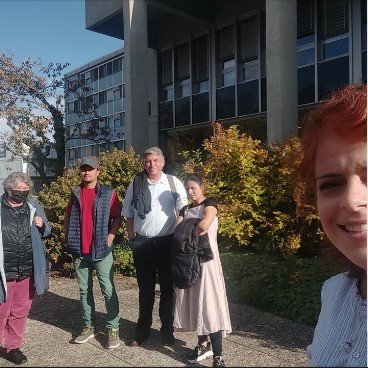#nonviolence #HumanRights #PeaceCommunity
International Fellowship of Reconciliation - IFOR had the privilege to welcome to its office in Geneva on Monday October 10th -at the Ecumenical Center- two representatives of the Comunidad de Paz San José de Apartadó.
The Peace Community is a great 25 yrs outstanding practice of nonviolent resistance in a highly violent context.
Accompanied by the former director of Red Internacional de Derechos Humanos, IFOR's guests presented the ongoing concerning situation that the Peace Community faces on a daily basis in #Colombia.
The meeting has been an opportunity for further planning on solidarity actions in continuity with IFOR supporting initiatives.
IFOR has also shared this visiting opportunity with other partner organizations in Geneva such as Associazione Comunità Papa Giovanni XXIII.
IFOR's Main Representative, Zaira Zafarana, with the visiting guests of the CdP, Sayda Arteaga Guerra and Roviro Lopez Rivera and RIDHI Ramon Munoz in IFOR office.
Ecumenical Center in Geneva, headquarter of World Council of Churches, where the IFOR office is located in Geneva
IFOR's guests together with the Main representative of Associazione Comunità Papa Giovanni XXIII at the UN.
#non-violence #droits de l'homme #communauté de paix
Le Mouvement International de la Réconciliation - MIR a eu le privilège d'accueillir dans ses bureaux à Genève le lundi 10 octobre - au Centre Oecuménique - deux représentants de la Comunidad de Paz San José de Apartadó.
Accompagnés de l'ancien directeur de Red Internacional de Derechos Humanos, les invités d'IFOR ont présenté la situation préoccupante à laquelle la Communauté de Paix doit faire face quotidiennement en Colombie.
La réunion a été l'occasion de planifier des actions de solidarité dans la continuité des initiatives soutenues par IFOR.
L'IFOR a également partagé cette opportunité de visite avec d'autres organisations partenaires à Genève, comme l'Associazione Comunità Papa Giovanni XXIII.
Zaira Zafarana, représentante principale d'IFOR, avec les invités du CdP, Sayda Arteaga Guerra et Roviro Lopez Rivera et RIDHI Ramon Munoz dans les bureaux d'IFOR.
Centre oecuménique de Genève, siège du Conseil oecuménique des Eglises, où se trouve le bureau d'IFOR à Genève.
Les invités d'IFOR avec le représentant principal de l'Associazione Comunità Papa Giovanni XXIII à l'ONU.
#noviolencia #DerechosHumanos #ComunidadDePaz
International Fellowship of Reconciliation - IFOR tuvo el privilegio de recibir en su oficina de Ginebra el lunes 10 de octubre -en el Centro Ecuménico- a dos representantes de la Comunidad de Paz San José de Apartadó.
La Comunidad de Paz es una gran práctica de 25 años de resistencia no violenta en un contexto altamente violento.
Acompañados por el ex director de la Red Internacional de Derechos Humanos, los invitados de IFOR expusieron la preocupante situación que la Comunidad de Paz enfrenta cada día en #Colombia.
El encuentro ha sido una oportunidad para seguir planificando acciones de solidaridad en continuidad con las iniciativas de apoyo de IFOR.
IFOR también ha compartido esta oportunidad de visita con otras organizaciones asociadas en Ginebra como la Associazione Comunità Papa Giovanni XXIII.
La Representante Principal de IFOR, Zaira Zafarana, con los invitados de la CdP, Sayda Arteaga Guerra y Roviro Lopez Rivera y RIDHI Ramon Munoz en la oficina de IFOR.
Centro Ecuménico de Ginebra, sede del Consejo Mundial de Iglesias, donde se encuentra la oficina de IFOR en Ginebra
Los invitados de IFOR junto con el representante principal de la Associazione Comunità Papa Giovanni XXIII en la ONU.













